Commissioners of the Land Office make investment changes after questions arise

Leaders of Oklahoma’s Commissioners of the Land Office said Tuesday they’ve made changes requested by legislators after being questioned last summer about an investment by the agency in a local real estate firm that uses a rent-to-buy plan for people struggling to qualify for a mortgage.
Agency officials spoke with The Oklahoman following their annual pre-session budget presentation to members of the state House of Representatives’ education subcommittee for appropriations and budget. They said while the investment in Berry-Rock Homes has been successful, they have made changes to how the agency handles direct investments as a result of the concerns expressed to them.
The Commissioners of the Land Office administers state school lands and is responsible for the management of assets for the benefit of public education in Oklahoma. The aim of the agency is to gain a maximum return from the use of state school lands to support education funding. The Commissioners of the Land Office owns and manages about 726,000 surface acres and about 1.2 million mineral acres.
The Commissioners of the Land Office also manages nine state trusts and helps fund 507 school districts and 13 colleges and universities. During the 2023 fiscal year, the agency distributed $129.4 million to various educational entities.
Berry-Rock Homes was less than a year old when Oklahoma’s Commissioners of the Land Office invested in it
The agency initially invested $8 million in Berry-Rock Homes in December 2021. At that point, the company was less than a year old, and Mike Jackson, the executive director of the Legislative Office of Fiscal Transparency (LOFT), told Oklahoma Watch last summer that state law required a company to be at least a year old before an investment could be made.
There’s no question of the success of the investment — John Fischer, the agency’s assistant secretary, said Tuesday it returns 11 percent. But a report prepared last year by LOFT questioned the wisdom of the Commissioners of the Land Office making direct investments, such as the agency did with Berry-Rock. One of the report’s recommendations was the Legislature should “prohibit CLO from making direct investments in companies not publicly traded.”
Fischer acknowledged the agency perhaps moved too quickly on the investment, but said the agency’s intentions were good. Now, he said, instead of CLO “looking at one-off investments, we’re looking at it as an investment class, the same way other institutional investors handle them.”
“We are always looking at growing the trust and growing the returns,” he said. “Private-equity investments is a very good opportunity for growing investments. We ran instead of walked. There’s a better way of doing it, so we took a pause. We’re making an 11 percent return, but we listened to the Legislature, we listened to leadership and said, hey, they didn’t disagree with what we did, they kind of disagreed with how we got there. That’s why we take a step back and we learn from what people are telling us and we say, ‘Could we have done this smarter?’”

How much has the state received in returns from the Berry-Rock investment?
The investment in Berry-Rock has brought in $1,127,726 to date, including $220,000 for the third quarter of 2023, said Tristan Newbold, the agency’s director of legislative affairs. Dan Whitmarsh, Commissioners of the Land Office secretary, didn’t receive any questions from legislators about the investment during Tuesday’s budget hearing.
The Commissioners of the Land Office received $8.7 million in state appropriations for the 2020 fiscal year, but that’s dropped to $6.7 million for the past two fiscal years. For the 2025 fiscal year, Whitmarsh said the agency is asking for about $7.5 million, with hopes of adding a chief internal auditor position (costing about $127,500) and reallocating about $613,000 of reappropriated expired budgeted cash from the 2019 and 2021 fiscal years.
According to state records, the value of Commissioners of the Land Office's investment portfolio grew from $2.28 billion in 2020 to $2.63 billion in 2021, an increase of nearly 18%.
“We want to make sure we’re not asking for a certain set of money just to ask for it,” Whitmarsh said. “We want to make sure we’re spending those dollars wisely. Whether it’s $6.7 (million) or $8.4 or $5 or $12 million, we just want to make sure we’re at the right amount of money to be able to service the trust. … It’s not just about a number, it’s does that number help us achieve what we need to do for the agency?”
This article originally appeared on Oklahoman: Oklahoma education funding agency changes investment rules after report

